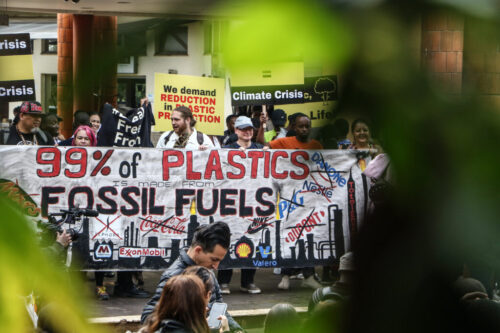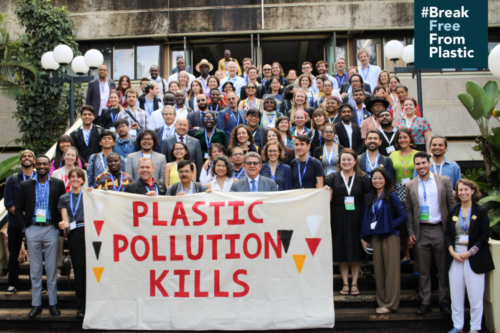I recently had the privilege of participating in the Biodiversity Funders Group’s Marine Conservation annual meeting in New Orleans – a town itself on the razor’s edge of climate calamity. There, I joined advocates who are working hard to reverse the destruction of the Earth’s oceans and communities. We discussed the ways the climate crisis is exacerbated by extractive activities in the oceans, the cascading effects that will create ever-worsening conditions for humanity, and the solutions needed to reverse course.
My partners in this conversation were Aarthi Ananthanarayanan, Director, Climate & Plastics at Ocean Conservancy; Michael Esealuka, U.S. Petrochemical Coordinator for Break Free From Plastic; and Carroll Muffett, President & CEO of the Center for International Environmental Law, along with our moderator, Oceankind Executive Director Matt Elliott. One thing we all agreed on: if we want elected officials to get serious about the climate crisis, we need to emphasize the inordinate impact the health of our oceans will have in any solutions they enact.
We know that oceans are full of plastic, polluting not just our coastal communities, but the entire ecosystem as we learn that microplastics are found from the arctic to the very bottom of the ocean floor. We know the oceans are rapidly acidifying, due to increased absorption of carbon dioxide. Millions of acres of stark white coral reefs around the world are a grave testament to the danger our oceans face, compounding the effects of climate change and putting the overall solutions further out of reach. And we know ocean temperatures are rising. Offshore temperatures in South Florida recently reached 104 degrees fahrenheit, an absolutely frightening number.
At a time when we need to be reducing fossil fuel use, the opposite is occurring in the petrochemical industry. BFFP panelist Esealuka discussed the effects on local communities saying, “Dramatically increasing the manufacturing of single use plastic we simply don’t need is how oil and gas corporations believe they can keep us chained to this toxic industry for another 20 years.” Ocean Conservancy’s Ananthanarayanan added, “Petrochemicals have replaced cars as the fastest-growing source for oil demand. They are the new gas guzzlers.” With that increased demand, extractive industries are moving operations into deeper and deeper ocean waters in search of new wells, harming the ocean many times over. Increased exploration disrupts ocean and local terrestrial environments, producing more petroleum that is refined into petrochemicals, which are then consumed, with a significant portion reentering the ocean as pollution and waste. As CIEL’s Muffett explained, “The chemical sector is the largest industrial consumer of both oil and gas, as well as the largest industrial energy consumer overall.” It is a dangerous cycle that accelerates the harm caused to the oceans, which then magnifies the climate effects and disasters we must mitigate.
The role of plastic manufacturing, waste, and pollution in furthering climate change is severely underrated. For example, it is fairly common knowledge that we all contain microplastics, as do the fish we eat and the waters in which we swim. And this is typically communicated as a dangerous side effect of plastic consumption. What’s less widely understood is how microplastics contaminate essential zooplankton and phytoplankton and reduce their ability to capture and transport carbon dioxide to the depths of the ocean, rather than returning to the atmosphere. According to Muffett, “Early indications that plastic pollution may interfere with the largest natural carbon sink on the planet should be cause for immediate attention and serious concern.”
The rise of new “monster fracking” has also raised alarms about the damage land-based petrochemical operations can have on the oceans. Due to the extreme amounts of water needed for fracking, often pulling freshwater directly from depleted aquifers communities rely on for drinking, deep fracking poses multiple threats. Not only does it divert a critically needed resource toward the petrochemical industry (and all its ills), it also returns water that has become highly toxic back into the ground, where it moves toward the coasts and into our oceans.
With our oceans playing such an important role in nearly every facet of daily life on this planet and facing threats from so many directions, one would assume that there is a political movement to protect them. However, despite widespread grassroots concern, we are seeing the exact opposite trends play out in major policy spaces around the world. The United States is on track to produce record amounts of oil and gas in 2023 and 2024. Record production will lead to record consumption, which will lead to record emissions. This has allowed investments in fossil fuel to increase at a time when mass divestment may be one of our best solutions. According to Ananthanarayanan, “we have to remember that there isn’t enough of an alternative for [developing] countries from public finance that supports development and climate change mitigation.”
Climate change is a complex web of crises, compounding and accelerating each other. The most effective solutions will be those that cut across geography, industry, and discipline. Drastically reducing the manufacturing, consumption, and disposal of petrochemicals and plastics must be the first of such goals. We must also ensure that any solutions are equitably-focused, providing relief to communities most harmed by the current state of affairs and the industry’s quest for profit. Solidarity between the hyperlocal and the international movements will be critical in forging a path forward that not only heals the planet and its oceans, but our people and communities around the world.
That is why initiatives like the Global Plastics Treaty are vital to climate policy. Massive grassroots efforts have spurred this potential for international cooperation that could curb the practices choking our oceans. As Esealuka said, the treaty is “a key priority moment for our movement… a once in a lifetime opportunity that will not come again.”
Philanthropic funders—Plastic Solutions Fund included–must step into this gap to support the innovative and effective organizations across the globe who are building the political will to make these major and essential changes.
– Nicky Davies, Executive Director at the Plastic Solutions Fund
Published October 2nd, 2023


